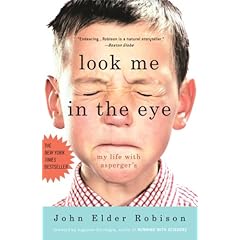
I realized recently that I hadn’t done a book review in a long time, and since last week I had the privilege of meeting and talking with John Elder Robison, I decided to write a review of Look Me in the Eye.
The quote across the top of the cover (actually, the boy’s forehead) says it all: “Endearing . . . Robison is a natural storyteller.” And that is exactly what’s so enjoyable about this book – his stories are captivating and entertaining. I loved reading about stories ranging from tricks he had played on a teacher who was mean to him and how he raised the money to do so, to how he got started restoring cars and taking radios apart, to how he got interested in guitars and amps and began working on them, which eventually led to his work with KISS. He tells stories about how he met his first girlfriend, how he interacted with his brother while growing up, and dealing with unstable parents. Reflected in all of his stories is a sense of empathy and his longing to connect with others and relate to them.
My favorite parts of the book include the chapter describing what it was like for him to be at a huge KISS concert, observing the magic of the lighting system that he designed and built. It’s an incredible passage written with details that made me feel like I was there, experiencing it. Definitely a must-read, along with the empowering chapter in which he figures out the cause of a major problem in one of the electronic toys manufactured by Milton Bradley. I also enjoyed the chapter which features Robison’s analysis of his process to develop socially and emotionally. His insight is remarkable, and anyone – parents of ASD children or not – reading his book has much to gain from it. I especially appreciate how he pointed out that child psychologists who observed “John prefers to play by himself” were completely wrong. The fact was that he did not know how to play and connect with others, not that he didn’t want to. It’s something that my son also struggled with, and continues to.
I loved reading about how Robison interacts with and teaches his son, the bond they share, and how he made peace with his parents later in life. The myth that people on the autism spectrum are not emotional is completely blown out of the water with this book. In the Postscript included in the paperback edition, Robison concludes with a plea: “I may look and act pretty strange at times, but deep down I just want to be loved and understood for who and what I am. I want to be accepted as part of society, not an outcast or outsider . . . I wish for empathy and compassion from those around me . . . I hope you’ll keep these thoughts in mind the next time you meet someone who looks or acts a little strange.” I will indeed. In fact, I already have. Look Me in the Eye is a fascinating story of life with Asperger’s – and being human. I highly recommend it.
